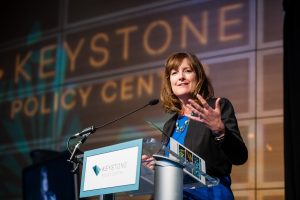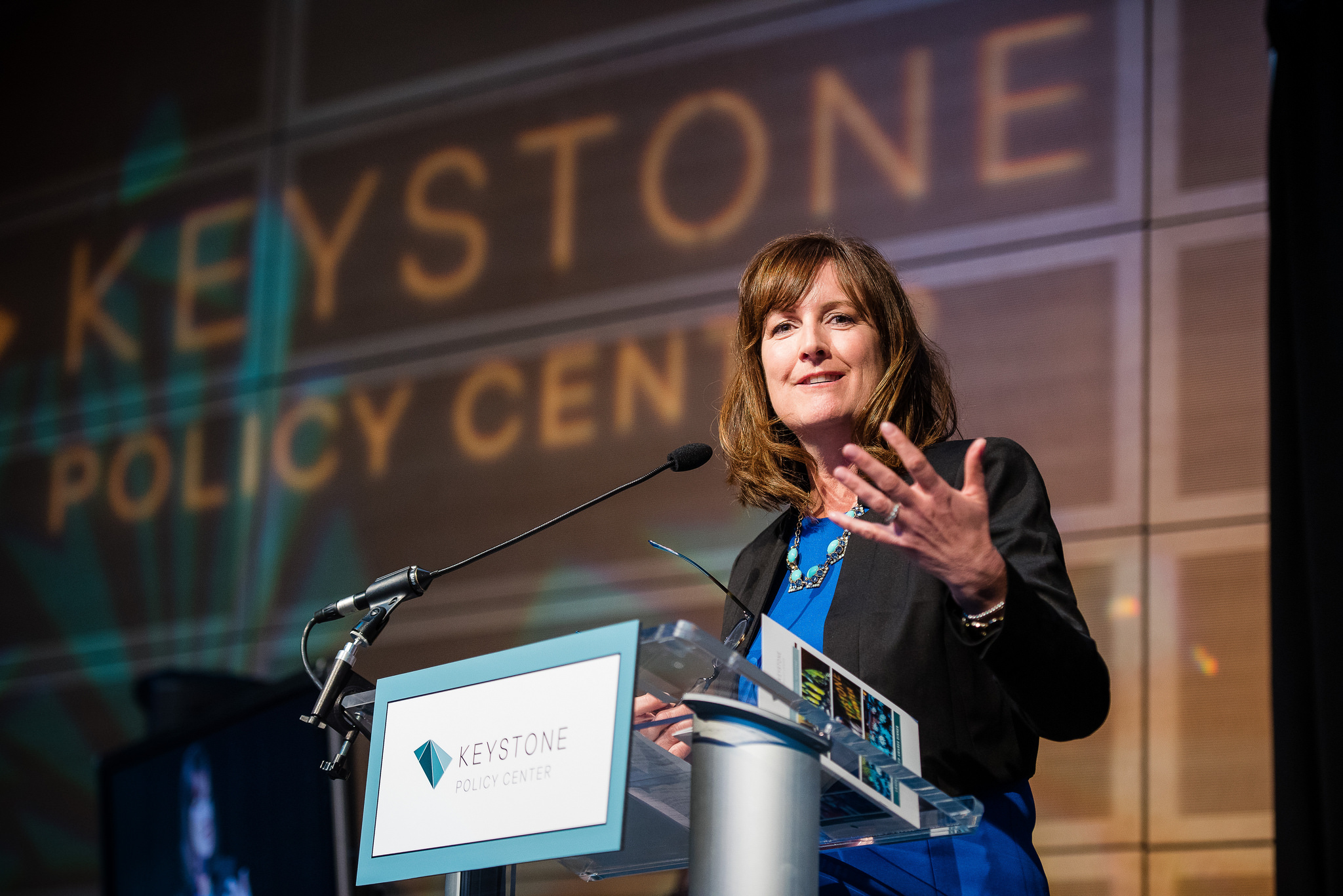Q&A with Keystone’s Christine Scanlan

Christine returned to Keystone after leading government and legislative affairs for Colorado Governor John Hickenlooper and several terms in the Colorado House of Representatives, where she worked across the aisle to reform the state’s education system and improve students’ access to opportunity.
* * *
Q: You often say that you believe Keystone’s mission is more important today than at any other time. Why do you believe that?
Christine Scanlan: The one constant in our ever-changing world has been the prevalence and persistence of the politics of division and gridlock. Clearly the status quo isn’t working in Washington, D.C., and beyond. Recent news has only underscored the limits of one group or another going it alone, especially when they try to address truly urgent, big issues like climate change.
Keystone has, through its more than four decades of experience, shown that collaborative decision making, inclusive dialogue, and a dedication to reaching what we call “common higher ground” is the only way to make progress toward lasting solutions.
I’m a hopeless optimist, but Keystone’s track record on contentious or entrenched issues like modernizing our education system, achieving sustainable agriculture, and confronting climate change show my belief is well founded.
Q: What advice would you give to a leader in the public, private, or NGO sector looking to foster collaboration?
CS: Collaboration starts with dialogue. Leaders should not be afraid to engage with those whom they disagree. Often times we have found through Keystone’s work, that this type of engagement can yield profound results — and often spur the first steps toward shared goals.
Q: How did you start working at Keystone?
CS: Bob Craig, Keystone’s founder, hired me and mentored me from my humble beginnings at Keystone as a program associate. Bob was a visionary and built Keystone from the ground up. Throughout that process and my career, Bob would challenge us to take risks. Keystone thrived and created a new approach to policymaking by inspiring us to do more than simply pursue lowest-common-denominator compromises.
Q: How has Keystone evolved over your tenure at the organization?
CS: Keystone has grown remarkably. It started as a small nonprofit in the mountains of Colorado and today does work throughout North America. We still have our roots along the Continental Divide of Colorado, but we’ve branched out to some of the most important public-policy dialogues and debates of our time.
I’m thrilled that Keystone is doing the work today that Bob Craig envisioned when we launched Keystone back in the 1970s. Bob once called Keystone an “unlikely” organization. Today that sentiment seems misplaced given our success in successfully tackling some of the most difficult issues out there — and, through it all, inspiring others to reach common higher ground.
One other big shift over the past few decades that Keystone has adapted to has been the changing role of the federal government in fostering dialogue. Federal agencies oftentimes were the primary conveners of policy dialogues and collaborative processes. Now we’re seeing states, municipalities and counties, and — most importantly — the private and NGO sectors stepping up and leading the conversations over how to tackle truly monumental policy challenges.
Q: Where do you see Keystone’s mission taking it over the next several years?
CS: For all of Keystone’s success, we still have a lot of work to do. We’re launching new program areas this year and diving head-first into some of the fastest moving debates — including those around new gene-editing technologies and in the world of education policy.
It’s an exciting time to be at Keystone, and I hope to have much more to share in the coming months.


 Effective March 1, 2025, Thomas J. Vilsack, former United States Secretary of Agriculture and Governor of Iowa, became the first Chief Executive Officer for the World Food Prize Foundation. In this new role, Governor Vilsack is focusing on expanding the Foundation’s global network, and will further position the Foundation as a leader in addressing global food and nutrition insecurity, continuing his lifetime of public service.
Effective March 1, 2025, Thomas J. Vilsack, former United States Secretary of Agriculture and Governor of Iowa, became the first Chief Executive Officer for the World Food Prize Foundation. In this new role, Governor Vilsack is focusing on expanding the Foundation’s global network, and will further position the Foundation as a leader in addressing global food and nutrition insecurity, continuing his lifetime of public service. Shelby Coffey III is a distinguished journalist, media executive, and thought leader whose career has helped shape the landscape of American news and public discourse. Over several decades, Coffey has held some of the most influential roles in journalism, including serving as editor of the Los Angeles Times, executive vice president of ABC News, and deputy managing editor of The Washington Post. His editorial leadership extended to key roles as president of CNN Financial News, editor of the Dallas Times Herald, and U.S. News & World Report.
Shelby Coffey III is a distinguished journalist, media executive, and thought leader whose career has helped shape the landscape of American news and public discourse. Over several decades, Coffey has held some of the most influential roles in journalism, including serving as editor of the Los Angeles Times, executive vice president of ABC News, and deputy managing editor of The Washington Post. His editorial leadership extended to key roles as president of CNN Financial News, editor of the Dallas Times Herald, and U.S. News & World Report. Jerry Steiner has spent 40 years involved in agriculture following growing up on a Wisconsin dairy farm. He began his career with Monsanto, in multiple business leadership roles. From 2003-2013 he served as a member of the Executive team, as the company’s Executive Vice President of Sustainability and Corporate Affairs. He led the company’s global Government, Public and Industry Affairs teams across the 70 countries where Monsanto conducts business. This experience got Jerry connected to the Keystones centers work in agriculture. Key among his responsibilities were shaping the company’s public policy and building partnerships aimed at helping farmers around the world produce more food, while conserving valuable resources like water and energy. Two unique partnership that developed under his leadership were drought tolerant corn with 5 African countries, CIMMYT and the Gates foundation, and a building a sustainable business model in Brazil with the value chain leading to significant multi-company investment and soybean varieties that can protected themselves.
Jerry Steiner has spent 40 years involved in agriculture following growing up on a Wisconsin dairy farm. He began his career with Monsanto, in multiple business leadership roles. From 2003-2013 he served as a member of the Executive team, as the company’s Executive Vice President of Sustainability and Corporate Affairs. He led the company’s global Government, Public and Industry Affairs teams across the 70 countries where Monsanto conducts business. This experience got Jerry connected to the Keystones centers work in agriculture. Key among his responsibilities were shaping the company’s public policy and building partnerships aimed at helping farmers around the world produce more food, while conserving valuable resources like water and energy. Two unique partnership that developed under his leadership were drought tolerant corn with 5 African countries, CIMMYT and the Gates foundation, and a building a sustainable business model in Brazil with the value chain leading to significant multi-company investment and soybean varieties that can protected themselves. Jennifer Morris is the Chief Executive Officer of The Nature Conservancy, leading a team of nearly 6,000 staff working in more than 80 countries and territories tackling the dual crises of the
Jennifer Morris is the Chief Executive Officer of The Nature Conservancy, leading a team of nearly 6,000 staff working in more than 80 countries and territories tackling the dual crises of the  Congressman Joe Neguse represents Colorado’s 2nd District in the U.S. House of Representatives. He was elected to his first term in November 2018, becoming the first Black Member of Congress in Colorado history. In December 2022, Rep. Neguse was elected by his colleagues to serve as Chair of the Democratic Policy and Communications Committee (DPCC), becoming the first Coloradan to serve in a senior elected leadership role in the House in over 85 years. He serves on the Natural Resources and Judiciary Committees, and was also appointed by House Minority Leader Hakeem Jeffries to serve as one of four Democrats on the prestigious Rules Committee. Rep. Neguse serves as Ranking Member on the House Subcommittee on Federal Lands, which he previously Chaired in the 117th Congress.
Congressman Joe Neguse represents Colorado’s 2nd District in the U.S. House of Representatives. He was elected to his first term in November 2018, becoming the first Black Member of Congress in Colorado history. In December 2022, Rep. Neguse was elected by his colleagues to serve as Chair of the Democratic Policy and Communications Committee (DPCC), becoming the first Coloradan to serve in a senior elected leadership role in the House in over 85 years. He serves on the Natural Resources and Judiciary Committees, and was also appointed by House Minority Leader Hakeem Jeffries to serve as one of four Democrats on the prestigious Rules Committee. Rep. Neguse serves as Ranking Member on the House Subcommittee on Federal Lands, which he previously Chaired in the 117th Congress. Llewellyn King was born in Southern Rhodesia, now Zimbabwe. He went into journalism as soon as he turned 16, stringing for Time magazine and United Press in Africa.
Llewellyn King was born in Southern Rhodesia, now Zimbabwe. He went into journalism as soon as he turned 16, stringing for Time magazine and United Press in Africa. Steven Williams is the Chief Executive Officer of PepsiCo North America, overseeing a more than $48 billion business that spans PepsiCo’s Foods and Beverage operating units. His leadership encompasses more than 125,000 associates and over 900 locations across the U.S. and Canada. Steven joined PepsiCo in 2001 as part of PepsiCo’s acquisition of the Quaker Oats Company, which he joined in 1997, and has held leadership positions of increased responsibility since.
Steven Williams is the Chief Executive Officer of PepsiCo North America, overseeing a more than $48 billion business that spans PepsiCo’s Foods and Beverage operating units. His leadership encompasses more than 125,000 associates and over 900 locations across the U.S. and Canada. Steven joined PepsiCo in 2001 as part of PepsiCo’s acquisition of the Quaker Oats Company, which he joined in 1997, and has held leadership positions of increased responsibility since.